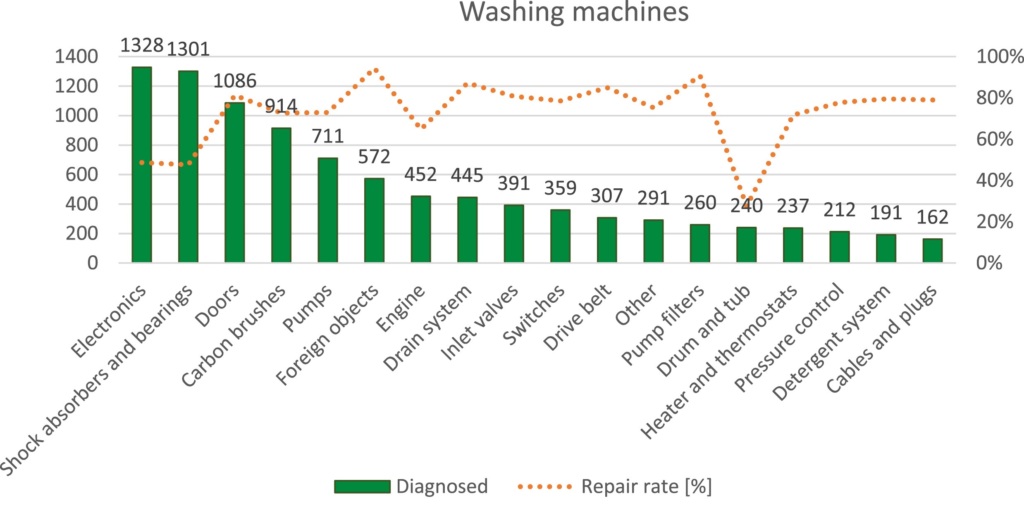
Shaam Beed
Designed to Last Intern, McGill University '24
For a machine designed to pour water on clothes and spin them around, “smart” washing machines are over-engineered and inconvenient.
Designed to Last Intern, McGill University '24
Director, Designed to Last Campaign, U.S. PIRG Education Fund
You might resent doing laundry, but for previous generations of humans a washing machine would seem like a magical device. The washing machine was a revolutionary invention that saved time, labor, and energy. Gone were the days of washing one’s clothes in the river, or individually beating the dirt out of garments with stones or paddles. With the click of a button, you could walk away and come back to freshly rinsed clothes that smelled like your favorite detergent. Now companies are trying to convince us that we need “smart” versions of this wonderfully effective technology. In reality, these products are needlessly overcomplicated and environmentally harmful.
The problem originates not just in the mass-production of low quality appliances, but also in corporations restricting our right to repair. Coupled with the complications of being programmed with “smart” software, these machines are slowly rolling back consumer rights and turning the uncomplicated task of laundry into a major contributor of global electronic waste, or e-waste. In fact, home appliances alone account for about 60% of e-waste. Some e-waste can be recycled, but the vast majority is improperly discarded and creates hazardous conditions for public health and the environment. Household appliances, such as refrigerators, dishwashers, and washing machines, are just not designed to last, and corporations are magnifying the nightmare with the application of smart technology.
WHIRLPOOL 4.8 cu. Ft. Smart Top Load Washer
Photo by Whirlpool | Used by permission
GE 48 cu. Ft. Capacity Smart Front Load Energy Star Washer with UltraFresh Vent System with OdorBlock™ and Sanitize w/Oxi
Photo by GE | Used by permission
LG 5.6 cu. ft. Mega Capacity Smart WiFi Enabled Top Load Washer with Agitator and TurboWash3D™ Technology
Photo by LG | Used by permission
1of 3
A case-study approach
For this article, we performed comparative case studies of smart washing machines from the three largest brands—Whirlpool, GE, LG—taking into consideration their warranties, privacy statements, and repair policies. Of the three companies, Whirlpool has the least cost effective warranty. It only covers repairs and labor for the first five years of ownership – the period of time when the machine is brand new. The other companies offer more inclusive warranties: GE offers one year for parts and ten years for the motor; LG offers one year for parts, three years for the stainless steel tub, and ten years for the motor. When companies offer longer coverage of these key parts, consumers are able to repair and use their machines for longer, which saves them money and saves landfills from yet another discarded machine. The duration of time that a company sells replacement parts for specific machines is also important to consider. Calls with customer representatives reveal that GE offers their parts for a minimum of 15 years from the machine’s release while LG a minimum of 10; Whirlpool’s customer support would not share this information with us. While Whirlpool’s warranty and coverage leaves much to be desired, GE and LG have policies that better support the customer’s right to repair and prevent waste. GE’s service manual explicitly states that consumers can do some repairs without a service technician, asserting our right to repair our appliance.
The concerning privacy implications of Wi-Fi-enabled smart washing machines greatly outweigh the supposed convenience of starting a load remotely. Companies can collect a startling range of data through the appliance itself or corresponding mobile applications. A quick scan of corporate privacy statements reveals that these machines collect data not just on usage and operation but also precise geolocation data, details of connected devices (phones, tablets, or computers) and, in the case of LG’s app, allow the collection of video recordings. There is no good reason for any of this. The only data a washer needs is about the laundry being washed.
Like most Wi-Fi connected devices, these machines require frequent software updates to patch security flaws, get new features, and ensure compatibility with the connected device. However, none of the three companies could speak to how long they would offer software support. Without a concrete answer to this question, these machines could pose a risk to a household’s network. Machines that are connected to Wi-Fi but cannot update to the newest software are susceptible to attacks and act as a gateway for criminals to access other machines on the network such as phones and computers. Thus, companies must commit to providing longer term — and explicit — software support, so as to not risk the home networks of their consumers. Is the ability to start laundry using a voice command worth the risk of a home network invasion?
When companies are unclear about how long they will support updates to software embedded in your washing machine, it could prevent repair in the future. This is already happening in the realm of phones and electric cars, where service technicians need to officially register repairs. For example, smart machines could sense foreign parts and use software to lock out repair or features, thus restricting consumers to specific manufacturers and clawing back their ownership rights. In addition, this software obsolescence drives the disposal of appliances, contributing to the ever-growing issue of global e-waste. When customers are unable to properly repair their machines, their recourse is to buy a new one. Smart technology comes with software that pushes consumers to replace their otherwise functional appliances. When manufacturers end support, the only way to ensure our networks are secure might be to replace the obsolete device. Unless manufacturers are willing to relinquish their control and allow the tech community to keep supporting older machines, software will keep driving the disposability treadmill. These modern problems come from smart devices that solve a problem no one has ever had. “Dumb” machines have simpler replacement parts, and no manufacturer support is required to keep them secure. As long as the motor spins the tub, your clothes will get cleaned.
Are manufacturers adding smart features to cover up for lower-quality manufacturing? In recent years, life expectancy for washing machines has plummeted. A BBC article reports that the average lifespan for washing machines “has dropped by a full three years over the last decade or so.” A UK study found that washing machines were the only appliance for which consumers overestimated their life expectancy. Why are washing machines dying sooner? Researchers have pointed to technological innovations as the cause. An Italian study on the lifetimes of washing machines and dishwashers found that many failures come from electronics issues, which they note have a growing presence “thanks to new functions for smart appliances.”

Photo by Paolo Tecchio, Fulvio Ardente, Fabrice Mathieux | CC-BY-4.0
Repair rate and total number of diagnosed washing machines. Source.
Wi-Fi dependent technology also complicates functionality. LG’s service manual includes a 12-point list detailing the various issues that could arise regarding Wi-Fi. For example, the appliance only supports 2.4 GHz Wi-Fi networks and the wireless network name (SSID) must have only specific characters. Wi-Fi dependent technology is fickle and high-maintenance, forcing consumers to bend over backwards in order to accommodate the particularities of their new washing machine.
Ultimately, what is the purpose of these gimmicky “smart” washing machines, considering the issues regarding cost-effectiveness, difficulty of repair, data collection, and susceptibility to attacks? They may offer slight conveniences when it comes to starting laundry remotely, purchasing restocks of detergent, and customizing your favorite cycles, but none of these minor “labor-savers” can outweigh the headache and risk that comes with smart washing machines. Moreover, the software complications of smart washing machines inhibit repair, which increases the turnover of machines and contributes to the disposability treadmill. Machines that work perfectly fine but need minor repairs are entirely discarded, throwing more unnecessary e-waste into the environment. We need to hold appliance companies accountable for the environmental harm that they are facilitating. We need products designed to last, not dumb smart machines no one asked for.
Designed to Last Intern, McGill University '24
Lucas leads PIRG’s Designed to Last campaign, fighting against obsolescence and e-waste and winning concrete policy changes that extend electronic consumer product lifespans and hold manufacturers accountable for forcing upgrades or disposal.
Report ●
